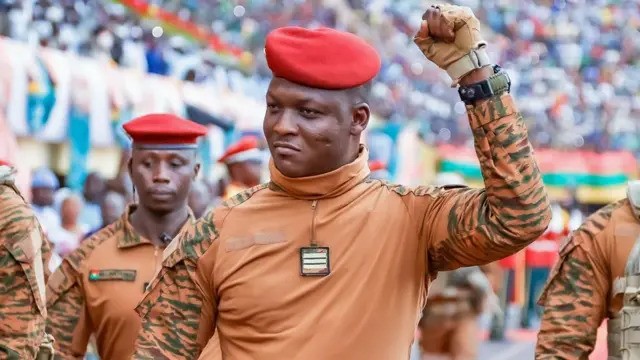A Revolutionary Spirit in Military Uniform
At just 37 years old, Captain Ibrahim Traoré, the leader of Burkina Faso, has become one of the most compelling figures in modern African politics. Charismatic, bold, and unapologetically pan-Africanist, Traoré is not merely a transitional military leader—he has become a symbol of a continent striving for dignity, sovereignty, and self-reliance.
Following in the Footsteps of Sankara
To many across Africa and the global Black diaspora, Traoré’s rise rekindles memories of Burkina Faso’s iconic former leader, Thomas Sankara. Like Sankara, Traoré has positioned himself as a man of the people—fierce in his rhetoric against neocolonialism and firm in his commitment to Africa-first policies.
His fiery 2023 speech at the Russia-Africa summit, where he urged African leaders to stop “dancing to the tune of imperialists,” became a defining moment. It echoed across borders, earning him admiration from citizens and commentators from Kenya to the Caribbean.
Economic Independence Through Bold Reforms
Since taking power in 2022, Traoré has enacted radical economic reforms aimed at reclaiming control over Burkina Faso’s natural resources. He introduced a national mining company, enforced local ownership requirements for foreign investors, and began construction on the country’s first gold refinery.
These policies haven’t just stirred the status quo—they’ve sparked a sense of economic nationalism and pride among Burkinabé citizens. The shift has drawn comparisons to early post-independence leaders like Kwame Nkrumah and Julius Nyerere, who championed self-determination.
Building Alliances on Burkina Faso’s Terms
Traoré’s foreign policy marks a clear departure from traditional alignments. His decision to sever military ties with France and pivot toward partnerships with Russia and other non-Western powers reflects his belief that Africa must set its own terms of engagement.
While this geopolitical shift has ruffled feathers in Western capitals, many Africans see it as a long-overdue step toward genuine sovereignty. Traoré and his counterparts in Mali and Niger have also exited ECOWAS, forming the Alliance of Sahel States, a new bloc asserting regional unity and strength.
A Youth Icon for a Young Continent
Burkina Faso’s median age is under 18. In such a youthful nation, Traoré—himself in his 30s—represents energy, relatability, and hope. His battle fatigues and confident oratory make him a stark contrast to the aging autocrats often seen clinging to power across the continent.
His popularity is amplified by his mastery of social media. From AI-generated tributes to real-life solidarity rallies in cities like London, Traoré’s image as a modern-day African hero continues to grow. He speaks not only to Africans at home but also to the diaspora communities seeking reconnection and revival.
Challenges Ahead, but Momentum is Real
While Traoré’s administration faces major hurdles—including ongoing security threats and governance critiques—his support remains strong. IMF and World Bank assessments note resilience in Burkina Faso’s economy, particularly in agriculture and services, and a reduction in extreme poverty.
His ability to channel patriotic sentiment into structural reforms sets him apart from many contemporaries. But the world is watching: will he transition from revolutionary to reformer? Can he institutionalize his vision and avoid the personalistic pitfalls of past military rulers?
Conclusion: A Symbol of Africa’s Turning Point
Captain Ibrahim Traoré is not just a Burkinabé leader—he is a new chapter in the African story. In his hands lie both immense promise and heavy responsibility. If he continues to prioritize sovereignty, social justice, and institutional strength, he could leave behind not only gold reserves but a legacy etched in history.
At a time when many African youth are disillusioned with traditional democracy, Traoré offers something rare: belief in an alternative future, one that is authentically African, fiercely independent, and proudly dignified.

